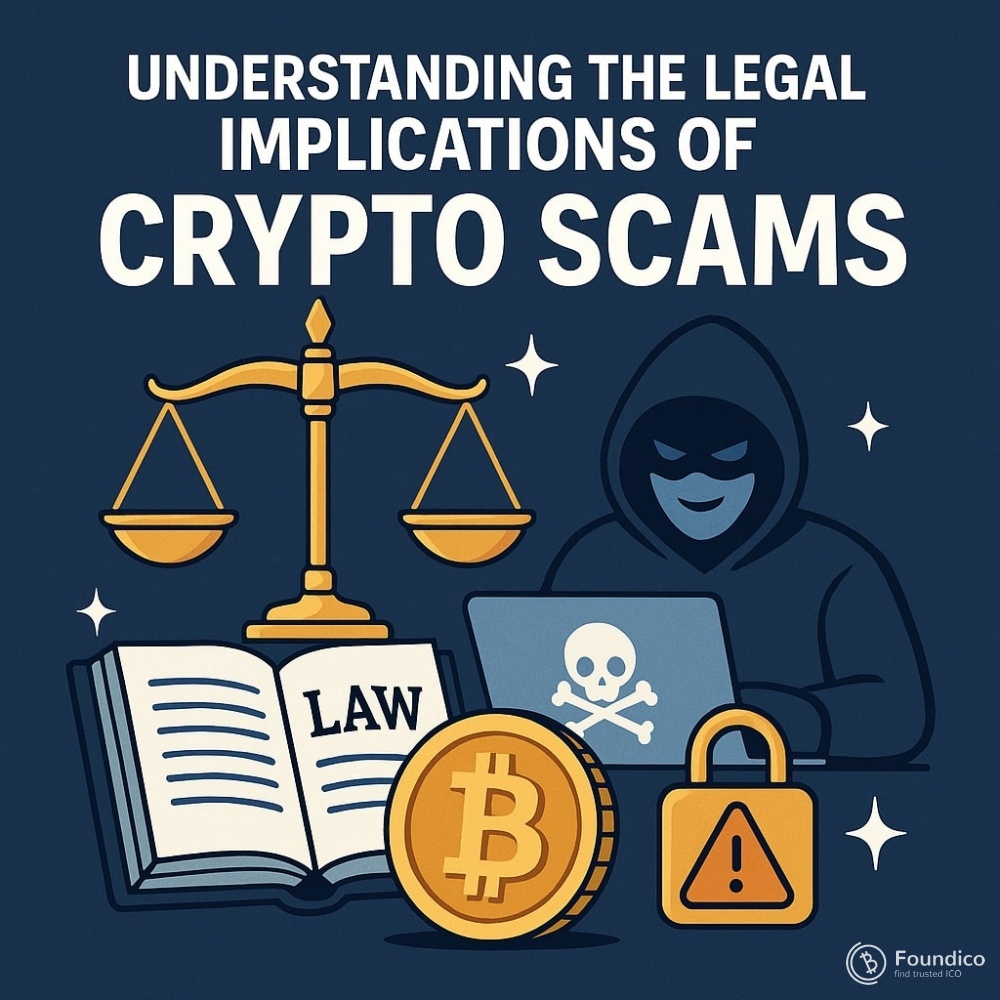Understanding the Legal Implications of Crypto Scams

By Dr. Pooyan Ghamari – Swiss Economist and Visionary
Introduction: The Rise of a New Threat in a Digital Frontier
The unprecedented growth of cryptocurrencies has reshaped financial ecosystems, democratized investment access, and challenged traditional banking. Yet, with this innovation comes an equally novel set of threats: crypto scams. These fraudulent schemes, often cloaked in technical complexity, continue to defraud individuals, institutions, and even governments. While regulatory frameworks lag behind, the legal ramifications of such crimes are quickly evolving—and becoming more significant.
This article aims to demystify the legal landscape surrounding crypto scams, exploring their classifications, jurisdictional challenges, enforcement realities, and evolving global policy frameworks.
1. Defining a Crypto Scam: Beyond Ponzi and Phishing
Crypto scams range widely in technique and intent. They are not merely high-tech versions of traditional fraud but often blend elements of securities fraud, consumer deception, and cybercrime. Common categories include:
-
Ponzi and Pyramid Schemes: Promising high returns with little risk, often paying earlier investors with new ones' funds.
-
Rug Pulls: Fraudsters abandon a project after raising substantial funds from investors, leaving tokens worthless.
-
Fake ICOs: Fraudulent Initial Coin Offerings that vanish post-investment.
-
Phishing and Social Engineering: Targeting wallet credentials and private keys.
-
Pump-and-Dump Schemes: Artificially inflating coin value before mass sell-offs.
The legal implications vary depending on the scam type, intent, and impact—but most cases fall under fraud, cybercrime, or financial misconduct in most jurisdictions.
2. Legal Classification: Fraud or Securities Violation?
The legal interpretation of crypto-related misconduct is still under construction in many countries. However, authorities are converging on a few key categorizations:
-
Fraud: Misrepresentation of facts to gain financial advantage is prosecutable almost universally.
-
Securities Law Violations: If the cryptocurrency or token in question is deemed a "security," then securities regulators such as the SEC (U.S.) or BaFin (Germany) step in.
-
Money Laundering: Many scams attempt to obfuscate funds through mixers, exchanges, and decentralized protocols, triggering AML (Anti-Money Laundering) and KYC (Know Your Customer) violations.
-
Unlicensed Financial Activity: Offering investment services or collecting deposits without licenses invites criminal liability.
Legal systems are increasingly using existing financial laws to prosecute crypto fraud, even in the absence of crypto-specific statutes.
3. Jurisdictional Challenges: A Legal No-Man’s Land?
One of the most complex legal issues in crypto scams is jurisdiction. Crypto assets are inherently borderless, making prosecution difficult when:
-
Fraudsters reside in uncooperative or offshore jurisdictions.
-
Victims are scattered across multiple countries.
-
The scam was executed via decentralized platforms with no physical presence.
This cross-border nature forces prosecutors to lean on international legal instruments such as:
-
Mutual Legal Assistance Treaties (MLATs).
-
Interpol Red Notices.
-
Bilateral cooperation between cybercrime units.
However, conflicting definitions of cryptocurrencies across countries hinder smooth extradition or asset seizure. Without a unified global framework, enforcement remains slow and fragmented.
4. Enforcement Trends: Turning the Tide
Despite the complexities, enforcement is improving. Major trends include:
-
Prosecution of High-Profile Cases: From BitConnect to OneCoin, governments are beginning to make examples of large-scale perpetrators.
-
Increased Regulatory Coordination: Task forces like the FATF's Crypto Asset Monitoring and the European MiCA Regulation are standardizing compliance.
-
Use of Blockchain Analytics: Agencies are leveraging advanced forensics tools to track transactions across pseudonymous wallets.
-
Sanctioning of Non-Compliant Exchanges: Entities that enable laundering or refuse KYC norms are facing shutdowns and asset freezes.
Still, the onus is often on the victim to report scams quickly, gather documentation, and pursue action—a burden that can be discouraging without clear legal pathways.
5. Victim Rights and Recourse: What Can You Do?
If you’ve been a victim of a crypto scam, the following steps are critical:
-
Report Immediately: File with local cybercrime units, Interpol, and financial regulators.
-
Preserve All Evidence: Screenshots, emails, transaction hashes—everything matters.
-
Seek Legal Counsel: Specialized legal firms increasingly offer services in crypto litigation.
-
Engage Blockchain Analysis Experts: They can often trace stolen funds to exchanges.
-
Join Class Actions: If the scam was widespread, collective action may increase leverage and speed.
Some jurisdictions allow civil suits for restitution, while others provide state-backed recovery programs—though success rates vary.
6. Policy Recommendations: A Call for Global Legal Reform
As a Swiss economist and observer of international financial law, I urge immediate policy alignment on the following:
-
Unified Crypto Classification: Whether as securities, commodities, or sui generis assets.
-
Global AML/KYC Frameworks: Including decentralized exchanges and DeFi protocols.
-
Crypto-Specific Fraud Legislation: Tailored to blockchain, tokenomics, and smart contract contexts.
-
Cross-Border Legal Collaboration: Real-time data exchange between enforcement bodies.
-
Public Education Campaigns: To reduce victimhood and encourage reporting.
Switzerland, with its Crypto Valley in Zug, offers a model: proactive regulation, transparency, and innovation coexist within a legal infrastructure. Other nations must follow suit—or risk losing public trust in this transformative sector.
Law Must Evolve with Technology
Cryptocurrencies are neither inherently good nor evil—they are tools. But in the hands of malicious actors, they can facilitate large-scale fraud with anonymity and speed. Understanding the legal implications of crypto scams is not just a matter for policymakers, but for investors, entrepreneurs, and ordinary citizens.
The solution lies not in banning the technology, but in equipping our legal systems to handle its abuse—swiftly, fairly, and globally.
As we move deeper into the digital financial era, vigilance, education, and strong legal frameworks will form the bulwark against deception.
Dr. Pooyan Ghamari is a Swiss economist and visionary specializing in digital economies, legal innovation, and financial infrastructure.
